英语作文生活是就一场战争
- 格式:docx
- 大小:17.80 KB
- 文档页数:5
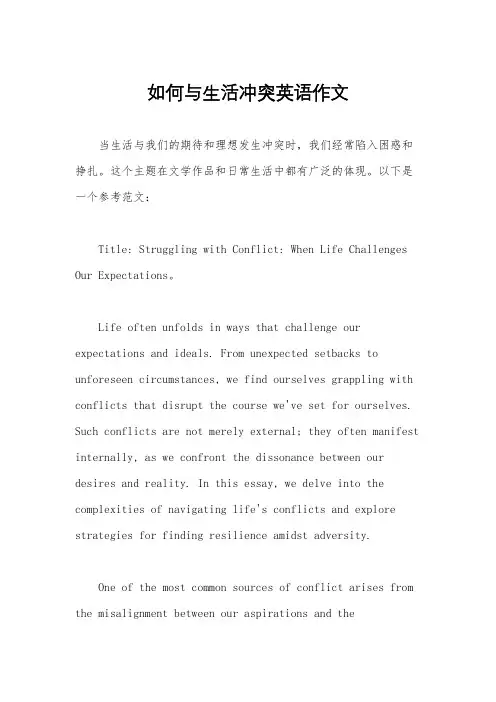
如何与生活冲突英语作文当生活与我们的期待和理想发生冲突时,我们经常陷入困惑和挣扎。
这个主题在文学作品和日常生活中都有广泛的体现。
以下是一个参考范文:Title: Struggling with Conflict: When Life Challenges Our Expectations。
Life often unfolds in ways that challenge our expectations and ideals. From unexpected setbacks to unforeseen circumstances, we find ourselves grappling with conflicts that disrupt the course we've set for ourselves. Such conflicts are not merely external; they often manifest internally, as we confront the dissonance between our desires and reality. In this essay, we delve into the complexities of navigating life's conflicts and explore strategies for finding resilience amidst adversity.One of the most common sources of conflict arises from the misalignment between our aspirations and thelimitations of reality. We envision a future brimming with success, happiness, and fulfillment, only to encounter obstacles that thwart our progress. Whether it's a career setback, a failed relationship, or health issues, these challenges force us to reassess our priorities and adapt to new circumstances. However, the process of reconciling our dreams with the harshness of reality is often fraught with pain and disillusionment.Take, for instance, the story of John, a young entrepreneur who poured his heart and soul into launching a tech startup. With grand visions of revolutionizing the industry, he invested countless hours and resources into his venture, convinced of its inevitable success. However, despite his best efforts, the company floundered, succumbing to fierce competition and market volatility. John found himself at a crossroads, grappling with feelings of failure and inadequacy. His once-promising future now seemed uncertain, overshadowed by the harsh realities of the business world.In moments of conflict, it's natural to experience arange of emotions, from anger and frustration to sadness and despair. These feelings can be overwhelming, clouding our judgment and hindering our ability to cope effectively. However, it's essential to acknowledge and process these emotions rather than suppress them. By confronting our feelings head-on, we can gain a deeper understanding of ourselves and our situation, paving the way for healing and growth.Moreover, it's crucial to cultivate resilience in the face of adversity. Resilience enables us to bounce back from setbacks, emerging stronger and more resilient than before. This resilience stems from a combination of inner strength, adaptability, and a willingness to persevere in the face of challenges. Instead of viewing conflicts as insurmountable obstacles, we can choose to see them as opportunities for growth and self-discovery. By embracing adversity with an open mind and a positive attitude, we can transform setbacks into stepping stones towards success.For John, the road to recovery was fraught with challenges, but he refused to let his setbacks define him.Instead of dwelling on his failures, he chose to learn from them, gaining valuable insights that would shape his future endeavors. With renewed determination and a newfound senseof purpose, he embarked on a new venture, armed with the wisdom and experience gained from his past struggles. While the path ahead was far from easy, John faced it withcourage and resilience, confident in his ability to overcome whatever obstacles lay in his way.In conclusion, life is rife with conflicts that testour resilience and strength of character. Whether it's a career setback, a personal loss, or an unforeseen challenge, we must confront these conflicts with courage and perseverance. By acknowledging our emotions, cultivating resilience, and embracing adversity as an opportunity for growth, we can navigate life's challenges with grace and resilience. As we face the uncertainties of the future, let us remember that it is our response to adversity that defines us, not the conflicts themselves.。
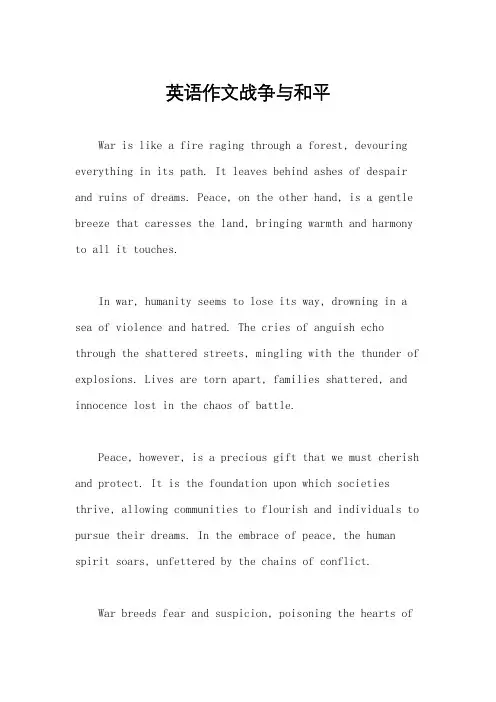
英语作文战争与和平War is like a fire raging through a forest, devouring everything in its path. It leaves behind ashes of despair and ruins of dreams. Peace, on the other hand, is a gentle breeze that caresses the land, bringing warmth and harmony to all it touches.In war, humanity seems to lose its way, drowning in a sea of violence and hatred. The cries of anguish echo through the shattered streets, mingling with the thunder of explosions. Lives are torn apart, families shattered, and innocence lost in the chaos of battle.Peace, however, is a precious gift that we must cherish and protect. It is the foundation upon which societies thrive, allowing communities to flourish and individuals to pursue their dreams. In the embrace of peace, the human spirit soars, unfettered by the chains of conflict.War breeds fear and suspicion, poisoning the hearts ofthose caught in its grasp. It builds walls between nations and divides people along lines of ideology and identity.The wounds it inflicts, both physical and emotional, may never fully heal, leaving scars that linger for generations.Peace, on the other hand, fosters trust and understanding among nations. It opens doors to dialogue and cooperation, paving the way for progress and prosperity. In the absence of conflict, bridges are built, connecting people across boundaries and fostering a sense of global unity.War is fueled by greed, power, and the thirst for dominance. It sows seeds of destruction and reaps a bitter harvest of suffering and sorrow. Its legacy is written inthe blood of the fallen, a stark reminder of the cost of human folly.Peace, however, is a beacon of hope in a world darkened by conflict. It is a testament to the resilience of the human spirit and the power of reconciliation. In itsembrace, wounds are healed, scars fade, and the promise of a brighter tomorrow shines brightly on the horizon.。
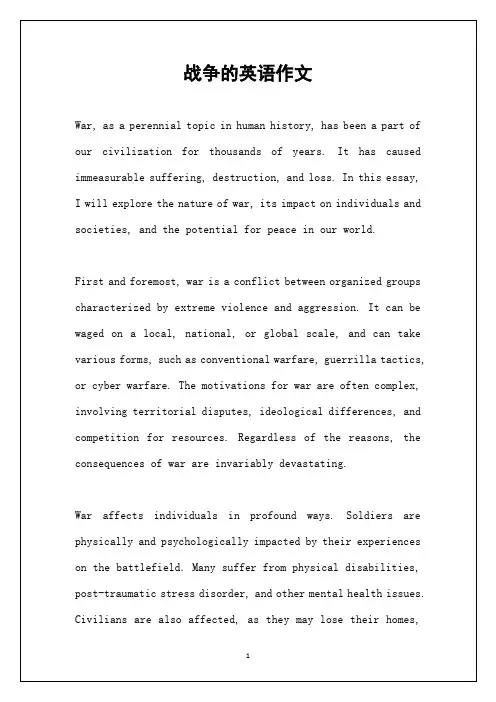
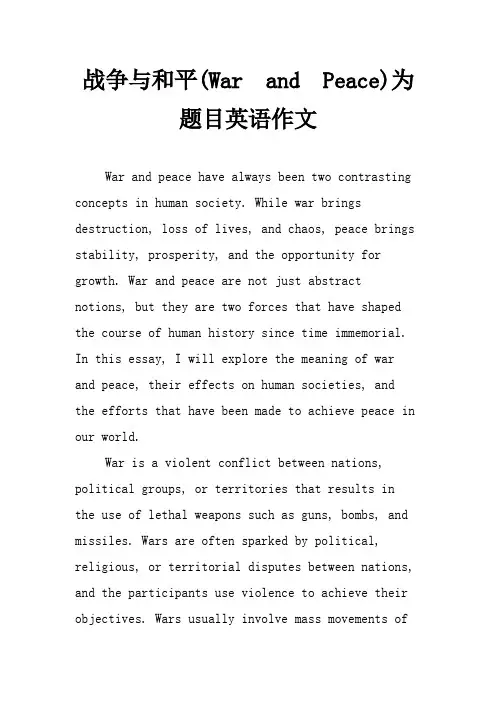
战争与和平(War and Peace)为题目英语作文War and peace have always been two contrasting concepts in human society. While war brings destruction, loss of lives, and chaos, peace brings stability, prosperity, and the opportunity for growth. War and peace are not just abstract notions, but they are two forces that have shaped the course of human history since time immemorial. In this essay, I will explore the meaning of war and peace, their effects on human societies, and the efforts that have been made to achieve peace in our world.War is a violent conflict between nations, political groups, or territories that results in the use of lethal weapons such as guns, bombs, and missiles. Wars are often sparked by political, religious, or territorial disputes between nations, and the participants use violence to achieve their objectives. Wars usually involve mass movements ofpeople, widespread destruction of infrastructure and property, and the loss of countless innocent lives. Wars devastate people emotionally, physically, and financially, leading to long-lasting negative consequences for society.On the other hand, peace is a state of social harmony where people live together in tranquility, devoid of violence and conflict. Peace can only exist when both individuals and policy-makers commit to peaceful co-existence, social integration, and equitable distribution of resources. Peace enables communities to grow, develop, and prosper socially, culturally, and economically.War and peace are not just theoretical concepts but have very real impacts on the lives of people around the world. Throughout history, there have been numerous wars that have torn societies apart, leaving behind scars that have yet to be healed. World War I and World War II are vivid examples of global conflicts that have left devastating effects on the world. Millions of people lost their lives,and infrastructure on a mass scale was destroyed, leading to long-lasting consequences for not only the nations that were directly involved but for the entire world.In contrast, the success stories of various nations and communities that have put genuineefforts toward peace are very encouraging. For instance, the European Union, a collective of 27 European countries that promote economic and political stability, is an example of how peace initiatives can bring positive change. North and South Korea's joint efforts toward peace, and the resulting peace agreement between the two nations, demonstrates that peace is possible even after years of conflict and division.Various peace initiatives have been implemented globally, such as the United Nations, UNESCO, and the International Criminal Court, to name a few. These organizations work towards promoting peace, justice, human rights, and resolving conflicts through peaceful means. Although there is still much work to be done, such efforts have contributedto reducing the number of conflicts around the world.In conclusion, war and peace are two contrasting forces that shape our world. War brings about destruction and loss of life, while peace promotes social harmony and enables communities to prosper. Peace-building requires commitment from both individuals and policy-makers, coupled with social integration and equitable distribution of resources. The impact of war and peace on human societies is tremendous, and efforts toward peace, collaboration, and understanding are crucial in promoting a better future for all.。
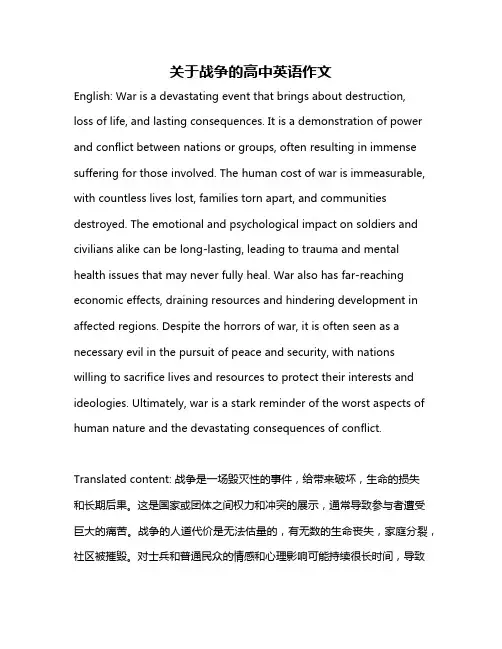
关于战争的高中英语作文English: War is a devastating event that brings about destruction,loss of life, and lasting consequences. It is a demonstration of power and conflict between nations or groups, often resulting in immense suffering for those involved. The human cost of war is immeasurable, with countless lives lost, families torn apart, and communities destroyed. The emotional and psychological impact on soldiers and civilians alike can be long-lasting, leading to trauma and mental health issues that may never fully heal. War also has far-reaching economic effects, draining resources and hindering development in affected regions. Despite the horrors of war, it is often seen as a necessary evil in the pursuit of peace and security, with nations willing to sacrifice lives and resources to protect their interests and ideologies. Ultimately, war is a stark reminder of the worst aspects of human nature and the devastating consequences of conflict.Translated content: 战争是一场毁灭性的事件,给带来破坏,生命的损失和长期后果。
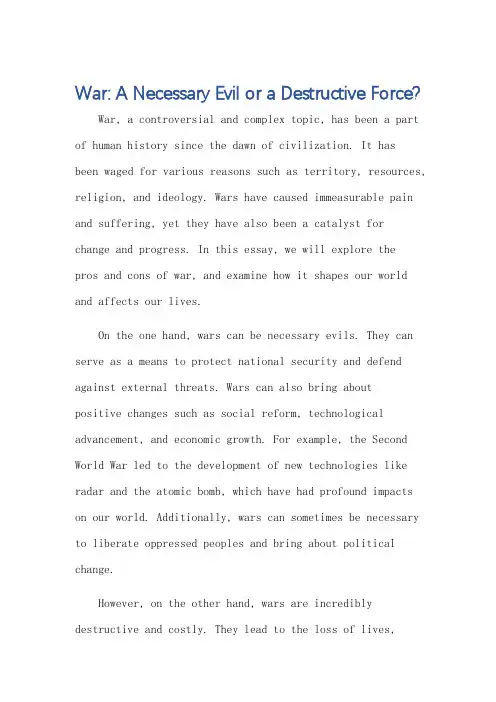
War: A Necessary Evil or a Destructive Force? War, a controversial and complex topic, has been a part of human history since the dawn of civilization. It hasbeen waged for various reasons such as territory, resources, religion, and ideology. Wars have caused immeasurable pain and suffering, yet they have also been a catalyst for change and progress. In this essay, we will explore thepros and cons of war, and examine how it shapes our world and affects our lives.On the one hand, wars can be necessary evils. They can serve as a means to protect national security and defend against external threats. Wars can also bring aboutpositive changes such as social reform, technological advancement, and economic growth. For example, the Second World War led to the development of new technologies like radar and the atomic bomb, which have had profound impacts on our world. Additionally, wars can sometimes be necessary to liberate oppressed peoples and bring about political change.However, on the other hand, wars are incredibly destructive and costly. They lead to the loss of lives,both military and civilian, and cause immense pain and suffering. Wars also destroy infrastructure, disrupt economies, and leave behind a trail of environmental devastation. The long-term effects of war can be felt for generations, as seen in countries that have experienced conflict for decades.Moreover, wars often have negative impacts on international relations and global stability. They create animosity and mistrust between nations, making it difficult to resolve conflicts peacefully in the future. Wars can also lead to the emergence of new conflicts and crises, as seen in the cases of post-war power struggles and ethnic conflicts.In conclusion, war is a complex topic that cannot be simply categorized as good or bad. While wars can sometimes be necessary to defend national security and bring about positive changes, they are also incredibly destructive and costly. It is important that we strive to resolve conflicts peacefully and avoid wars whenever possible. When wars do occur, it is crucial that we work towards ending them assoon as possible and seek to rebuild and heal the woundsleft behind.**如何看待战争**战争,这个充满争议和复杂性的主题,自从人类文明曙光初现以来,便成为人类历史的一部分。
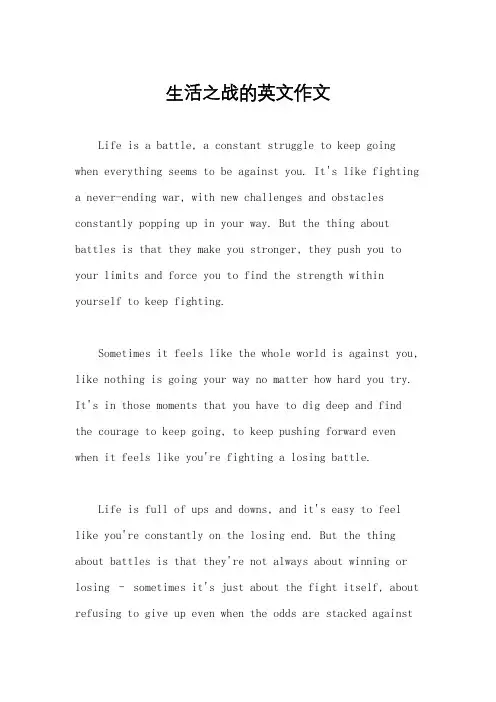
生活之战的英文作文Life is a battle, a constant struggle to keep going when everything seems to be against you. It's like fighting a never-ending war, with new challenges and obstacles constantly popping up in your way. But the thing about battles is that they make you stronger, they push you to your limits and force you to find the strength within yourself to keep fighting.Sometimes it feels like the whole world is against you, like nothing is going your way no matter how hard you try. It's in those moments that you have to dig deep and find the courage to keep going, to keep pushing forward even when it feels like you're fighting a losing battle.Life is full of ups and downs, and it's easy to feel like you're constantly on the losing end. But the thing about battles is that they're not always about winning or losing – sometimes it's just about the fight itself, about refusing to give up even when the odds are stacked againstyou.There are times when it feels like you're fighting alone, like no one understands what you're going through or the battles you're facing. But it's important to remember that you're never truly alone, that there are always people who care about you and want to support you in your struggles.In the end, life is a battle that we all have to fight in our own way. It's about finding the strength to keep going, the courage to face whatever comes our way, and the resilience to keep fighting even when it feels like the odds are stacked against us. And in the end, it's the battles we fight that make us who we are.。
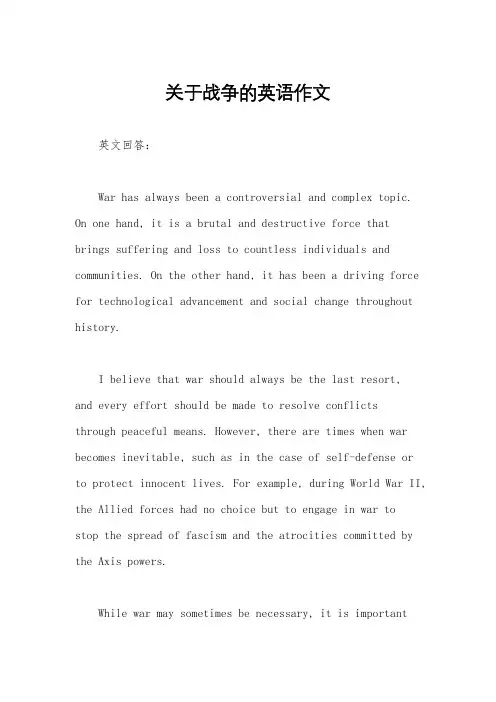
关于战争的英语作文英文回答:War has always been a controversial and complex topic. On one hand, it is a brutal and destructive force thatbrings suffering and loss to countless individuals and communities. On the other hand, it has been a driving force for technological advancement and social change throughout history.I believe that war should always be the last resort,and every effort should be made to resolve conflictsthrough peaceful means. However, there are times when war becomes inevitable, such as in the case of self-defense orto protect innocent lives. For example, during World War II, the Allied forces had no choice but to engage in war tostop the spread of fascism and the atrocities committed by the Axis powers.While war may sometimes be necessary, it is importantto recognize the human cost and to strive for peace whenever possible. The emotional toll of war is immeasurable, as it tears families apart and leaves scars that last for generations. As the saying goes, "War is hell," and it is something that should never be taken lightly.中文回答:战争一直是一个充满争议和复杂的话题。
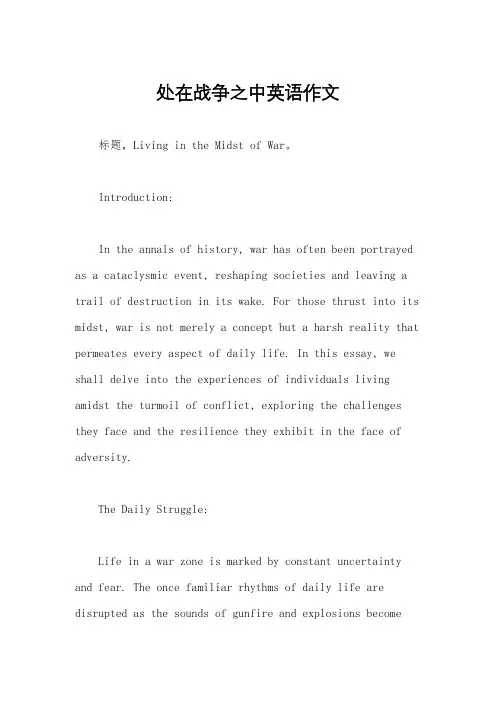
处在战争之中英语作文标题,Living in the Midst of War。
Introduction:In the annals of history, war has often been portrayed as a cataclysmic event, reshaping societies and leaving a trail of destruction in its wake. For those thrust into its midst, war is not merely a concept but a harsh reality that permeates every aspect of daily life. In this essay, we shall delve into the experiences of individuals living amidst the turmoil of conflict, exploring the challenges they face and the resilience they exhibit in the face of adversity.The Daily Struggle:Life in a war zone is marked by constant uncertainty and fear. The once familiar rhythms of daily life are disrupted as the sounds of gunfire and explosions becomecommonplace. For many, the simple act of stepping outside their homes becomes a perilous endeavor, fraught with the risk of injury or death. Basic necessities such as food, water, and shelter become increasingly scarce, as supply lines are disrupted and infrastructure is destroyed. Families are torn apart, as loved ones are separated by conflict or fall victim to its indiscriminate violence.Psychological Toll:Beyond the physical hardships, the psychological toll of war is profound. The constant exposure to violence and trauma leaves deep emotional scars, manifesting in anxiety, depression, and post-traumatic stress disorder (PTSD). Children, in particular, are vulnerable to the psychological effects of war, their innocence shattered by the horrors they witness and experience. The pervasive sense of insecurity breeds mistrust and suspicion, eroding the social fabric of communities and sowing the seeds of future conflict.Acts of Courage and Resilience:Amidst the darkness of war, however, there are glimpses of light – acts of courage and resilience that inspire hope amidst despair. Ordinary individuals rise to extraordinary heights, risking their lives to help othersin need. From makeshift hospitals staffed by volunteer doctors and nurses to community-led initiatives providing aid to the displaced, acts of compassion and solidarity abound amidst the chaos of conflict. These acts serve as a testament to the indomitable human spirit, reaffirming our capacity for empathy and altruism even in the bleakest of circumstances.The Long Road to Recovery:As the guns fall silent and the smoke of battle clears, the task of rebuilding shattered societies begins. The road to recovery is long and arduous, marked by daunting challenges and painful reckonings. Reconciliation efforts must address the deep-seated grievances that fuelled the conflict, fostering a culture of forgiveness and mutual understanding. Economic reconstruction is essential toalleviate the poverty and deprivation that are the legacyof war, providing opportunities for employment and livelihoods. And perhaps most importantly, investments must be made in education and healthcare, empowering individuals and communities to chart a path towards a more peaceful and prosperous future.Conclusion:In the crucible of war, humanity is both tested and tempered. While the scars of conflict may run deep, so too does the resilience of the human spirit. Through acts of courage and compassion, individuals living amidst theturmoil of war demonstrate the power of solidarity and hope. As we strive to build a more just and peaceful world, letus draw inspiration from their example, and work tirelessly towards a future where war is but a distant memory.。
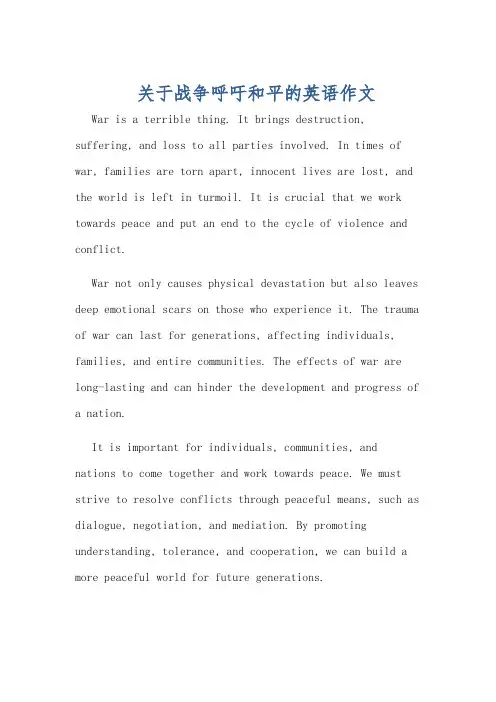
关于战争呼吁和平的英语作文War is a terrible thing. It brings destruction, suffering, and loss to all parties involved. In times of war, families are torn apart, innocent lives are lost, and the world is left in turmoil. It is crucial that we work towards peace and put an end to the cycle of violence and conflict.War not only causes physical devastation but also leaves deep emotional scars on those who experience it. The trauma of war can last for generations, affecting individuals, families, and entire communities. The effects of war are long-lasting and can hinder the development and progress of a nation.It is important for individuals, communities, and nations to come together and work towards peace. We must strive to resolve conflicts through peaceful means, such as dialogue, negotiation, and mediation. By promoting understanding, tolerance, and cooperation, we can build a more peaceful world for future generations.We must also address the root causes of war, such as poverty, inequality, and injustice. By addressing these underlying issues, we can create a more just and equitable society where conflicts are less likely to arise. It is essential that we work towards building a world where all people can live in peace and harmony.In conclusion, war is a devastating and destructive force that must be avoided at all costs. We must work together to promote peace, understanding, and cooperation in order to build a more peaceful world for all. Let us strive to create a world where war is a thing of the past and peace reigns supreme.战争是一件可怕的事情。
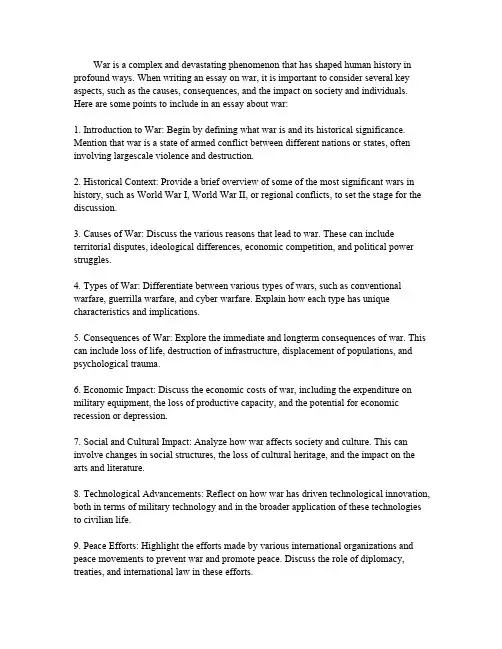
War is a complex and devastating phenomenon that has shaped human history in profound ways.When writing an essay on war,it is important to consider several key aspects,such as the causes,consequences,and the impact on society and individuals. Here are some points to include in an essay about war:1.Introduction to War:Begin by defining what war is and its historical significance. Mention that war is a state of armed conflict between different nations or states,often involving largescale violence and destruction.2.Historical Context:Provide a brief overview of some of the most significant wars in history,such as World War I,World War II,or regional conflicts,to set the stage for the discussion.3.Causes of War:Discuss the various reasons that lead to war.These can include territorial disputes,ideological differences,economic competition,and political power struggles.4.Types of War:Differentiate between various types of wars,such as conventional warfare,guerrilla warfare,and cyber warfare.Explain how each type has unique characteristics and implications.5.Consequences of War:Explore the immediate and longterm consequences of war.This can include loss of life,destruction of infrastructure,displacement of populations,and psychological trauma.6.Economic Impact:Discuss the economic costs of war,including the expenditure on military equipment,the loss of productive capacity,and the potential for economic recession or depression.7.Social and Cultural Impact:Analyze how war affects society and culture.This can involve changes in social structures,the loss of cultural heritage,and the impact on the arts and literature.8.Technological Advancements:Reflect on how war has driven technological innovation, both in terms of military technology and in the broader application of these technologies to civilian life.9.Peace Efforts:Highlight the efforts made by various international organizations and peace movements to prevent war and promote peace.Discuss the role of diplomacy, treaties,and international law in these efforts.10.Personal Stories:Include personal narratives or testimonials from those who have experienced war firsthand to humanize the discussion and provide a more intimate perspective on the impact of war.11.Conclusion:Conclude the essay by summarizing the main points and reflecting on the importance of understanding war in order to work towards a more peaceful world. Remember to use a variety of sources to support your arguments and to maintain a balanced and objective tone throughout the essay.Additionally,consider the ethical implications of war and the role of individuals and societies in preventing conflict and promoting peace.。
对战争看法英文作文英文:When it comes to war, my feelings are mixed. On one hand, I understand that sometimes war is necessary toprotect a country or its people. For example, during World War II, the Allied Powers had to fight against the Axis Powers to stop their aggression and atrocities. In this case, war was a means to an end, and it ultimately helpedto bring about peace and justice.However, on the other hand, war is a terrible thing. It causes destruction, death, and suffering on a massive scale. Innocent civilians are often caught in the crossfire, and soldiers on both sides lose their lives or suffer permanent injuries. War also has long-lasting effects, as it can lead to economic instability, political turmoil, and social unrest.Personally, I believe that war should always be a lastresort. Diplomacy, negotiation, and compromise shouldalways be the first options when dealing with conflicts. Only when all peaceful solutions have been exhausted should military action be considered. Even then, it should be done with restraint and a clear plan for achieving a just and lasting peace.中文:谈到战争,我的感觉很复杂。
战争与生命的英语作文英文:War and life are two concepts that are deeply intertwined, yet at the same time, they are also fundamentally different. War, in its essence, represents conflict, destruction, and loss. It brings about suffering, pain, and death. On the other hand, life symbolizes growth, creation, and preservation. It embodies the beauty of existence, the pursuit of happiness, and the fulfillment of dreams.War has always been a part of human history, and it has had a profound impact on the course of civilization. It has led to the rise and fall of empires, the reshaping of borders, and the transformation of societies. However, it has also brought about immense human suffering, leaving behind scars that may never fully heal.I remember the story of my grandfather, who fought in awar many years ago. He used to tell me about the horrors he witnessed, the friends he lost, and the emotional toll it took on him. War had robbed him of his youth, his innocence, and his peace of mind. It had left him with physical and emotional wounds that never truly healed. His experiences taught me that war is not just about weapons and battles, but also about the human cost it exacts.Despite the devastation and despair that war brings,life continues to persist. People find ways to rebuild, to heal, and to move forward. They find strength in their communities, in their families, and in their resilience. They hold onto hope, they cherish love, and they strive for a better future.In my own life, I have witnessed the impact of war onmy own community. I have seen the resilience of people who have lost everything, yet still find the courage to rebuild their lives. I have seen the power of compassion and solidarity in times of great adversity. These experiences have taught me that while war may bring destruction, italso has the potential to bring out the best in humanity.中文:战争和生命是两个深深交织在一起的概念,然而同时,它们又是根本不同的。
The Tragedy of WarWar, a devastating phenomenon that has plagued human history for centuries, is a topic that cannot be ignored. It brings sorrow, suffering, and destruction to countless lives, leaving behind a trail of ruin and despair. In this essay, I will explore the various aspects of war, from its causes to its consequences, and reflect on its impact on humanity.The causes of war are complex and multifaceted. Often, they stem from political, economic, and territorial disputes between nations. Differences in ideology, religion, or cultural values can also fuel the flames of conflict. These tensions, if unresolved through diplomatic means, can lead to the outbreak of war, with devastating consequences for all involved.The consequences of war are devastating and far-reaching. The most immediate impact is the loss of life. Soldiers and civilians alike are killed or injured in the crossfire, leaving behind families and communities in mourning. Infrastructure is destroyed, cities are bombed, and livelihoods are ruined. War also has a profound psychological impact on those who survive, leaving them with trauma, anxiety, and depression that can last a lifetime.Furthermore, war disrupts the normal functioning of society. Economic activity is halted, schools are closed, and basic services like healthcare and sanitation are disrupted. This creates further hardship for the already-suffering civilian population. Additionally, the refugee crisis caused by war leads to overcrowding in neighboring countries, placing additional strain on their resources and infrastructure.The impact of war on humanity is profound and long-lasting. In the aftermath of war, reconstruction and healing take years, often decades. However, the scars of conflict remain etched in the hearts and minds of those who have experienced it.As human beings, we must strive to find ways to resolve disputes peacefully through dialogue, negotiation, and diplomacy. War is not a solution; it is a tragic end to differences that could otherwise be resolved through understanding and compromise. We must work towards a world where peace and cooperation prevail, where the voices of reason and compassion are heard above the drums of war.In conclusion, war is a tragedy that must be avoided at all costs. Its causes are complex, but its consequences are clear: suffering, destruction, and despair. We must learn from history and work towards a more peaceful and harmonious world, where the rights and dignity of all human beings are respected and protected.。
战争与生命的英语作文War and Life。
War, a word that carries a heavy weight and a deep impact on the lives of people and nations. Throughout history, war has been a constant presence, shaping the course of human civilization and leaving behind a trail of destruction and suffering. It is a phenomenon that has both fascinated and horrified mankind, and its effects on life are profound and far-reaching.War has the power to alter the course of history, to change the destiny of nations, and to reshape the lives of individuals. It is a force that can bring out the best and the worst in people, inspiring acts of bravery and heroism, but also unleashing the darkest impulses of hatred and violence. In war, lives are lost, families are torn apart, and societies are shattered. The toll of war on human life is immeasurable, and its scars are etched into the collective memory of humanity.The impact of war on life extends beyond the physical and material destruction it causes. It also leaves behind deep emotional and psychological wounds that can take generations to heal. The trauma of war can hauntindividuals and communities long after the guns have fallen silent, leaving a legacy of pain and suffering that is passed down from one generation to the next. The mental and emotional toll of war is often overlooked, but it is just as real and enduring as the physical devastation it leaves in its wake.In the face of war, the resilience and strength of the human spirit are put to the test. People are forced to confront the fragility of life, the depths of their own courage, and the capacity for compassion and empathy in the midst of conflict. War can bring out the worst in people, but it can also bring out the best, inspiring acts of selflessness and sacrifice that remind us of the inherent value of life.In the aftermath of war, the task of rebuilding andhealing begins. It is a long and arduous process, one that requires not only the physical reconstruction of buildings and infrastructure, but also the emotional and psychological healing of individuals and communities. The scars of war run deep, and they cannot be erased overnight. It takes time, patience, and a collective effort to overcome the legacy of war and to create a future that is free from its shadow.In conclusion, war has a profound and lasting impact on life. It has the power to shape the course of history, to leave behind a trail of destruction and suffering, and to test the resilience and strength of the human spirit. The toll of war on human life is immeasurable, but so too is the capacity for healing and renewal. In the face of war, we are reminded of the preciousness of life and the enduring power of hope.。
英语作文生活是就一场战争Life Is a Struggle 生活是就一场战争Life is a struggle. I shall never forget the most striking part of Henry Wadsworth Longfellow' s poem -- A Psalm of Life: "In the world's blood field of battle, In the bivouac of life, Be not like dumb, driven cattle! Be a hero in the strife!"Ludwig van Beethoven was a typical "hero in the strife". He was not only one of the greatest composers, but also one of the most persevering men. As a deaf man, he went on working with his strong will in the last year of his life, though he was not able to hear his own fine and original music. Another example of persistence in struggle is Deng Yaping. She once said that her technique came from continuous training, emphasizing the importance of daily practice to a player.As a student, I seem to be in a boat sailiug against the current.I must make an effort to forge ahead. A little carelessness will result in being driven back. Indeed, learning is a struggle against idleness and carelessness. Following the examples of Ludwig van Beethoven and Deng Yaping, I shall take great pains to urge myself on, moving steadily forward like a heroic boatman in the rough sea of knowledge.生活是一场斗争。
战争对生活的影响英语作文War, a devastating phenomenon that has plagued humanity throughout history, leaves a profound impact on the lives of people and the fabric of societies. Its effects ripple through time and space, altering the course of individual destinies and national trajectories. The repercussions of war are not confined to the battlefield; they extend into the deepest recesses of daily life, affecting individuals and communities in myriad ways.The immediate impact of war is the loss of life and property. The brutality of conflict claims countless lives, leaving behind a trail of grief and sorrow. Families are torn apart, with many losing their loved ones to the violence. The destruction of homes and infrastructure forces people to flee, often becoming refugees with uncertain futures. The psychological trauma experienced by survivors is profound, with many suffering from post-traumatic stress disorder (PTSD), anxiety, and depression.Economically, war can devastate a nation's resources. The diversion of funds towards military expenditure often comes at the expense of essential services such as healthcare, education, and social welfare. The aftermath of war can lead to economic instability, inflation, and unemployment, further exacerbating the hardships faced by the populace.Socially, war can disrupt the fabric of society. The breakdown of community structures and the erosion of trust can lead to a sense of alienation and disconnection. Cultural heritage may be destroyed, and the transmission of traditions and knowledge is interrupted. The displacement of populations can result in the loss of community identity and a sense of belonging.Politically, war can lead to significant changes in governance and policy. It can alter power dynamics, leading to the rise of new leaders and the fall of established regimes. The quest for peace often results in complex negotiations and the redrawing of national boundaries, which can have lasting implications for international relations.Environmentally, the impact of war is equally catastrophic. The use of weapons and military operations can cause irreversible damage to ecosystems, leading to loss ofbiodiversity and long-term environmental degradation. The contamination of land and water sources with hazardous materials poses a serious threat to human health and the natural world.In conclusion, the impact of war on life is multifaceted and far-reaching. It affects every aspect of existence, from the personal to the global scale. The scars left by conflict are not easily healed, and the path to recovery and reconciliation is long and arduous. It is a stark reminder of the need for dialogue, understanding, and the relentless pursuit of peace. As we reflect on the consequences of war, we must commit ourselves to prevent such tragedies from recurring, for the sake of future generations and the preservation of our shared humanity. 。
英语作文生活是就一场战争 Life Is a Struggle 生活是就一场战争 Life is a struggle. I shall never forget the most striking part of Henry Wadsworth Longfellow' s poem -- A Psalm of Life: "In the world's blood field of battle, In the bivouac of life, Be not like dumb, driven cattle! Be a hero in the strife!" Ludwig van Beethoven was a typical "hero in the strife". He was not only one of the greatest composers, but also one of the most persevering men. As a deaf man, he went on working with his strong will in the last year of his life, though he was not able to hear his own fine and original music. Another example of persistence in struggle is Deng Yaping. She once said that her technique came from continuous training, emphasizing the importance of daily practice to a player. As a student, I seem to be in a boat sailiug against the current. I must make an effort to forge ahead. A little carelessness will result in being driven back. Indeed, learning is a struggle against idleness and carelessness. Following the examples of Ludwig van Beethoven and Deng Yaping, I shall take great pains to urge myself on, moving steadily forward like a heroic boatman in the rough sea of knowledge. 生活是一场斗争。
我永远不会忘记 Henry 沃兹沃思朗费罗的诗——生命的诗 篇中最引人注目的部分:“在世界的战斗血场,在野外生活,不要像哑巴,带动 牛!做一个战斗英雄!” 路德维希贝多芬是在斗争中一个典型的“英雄”。
他不仅是最伟大的作曲家 之一,但也是最有毅力的人之一。
作为一个聋子,他在他生命的最后一年工作的 坚强意志, 虽然他没能听到他自己的优秀原创音乐。
另一个例子是邓亚萍坚持斗 争。
她曾经说过,她的技术来自于不断的培训,强调对于一个球员日常实践的重 要性。
作为一名学生,我似乎是在逆水行舟。
我必须努力进取。
一个小的疏忽会导 致被击退。
事实上,学习是对懒惰和粗心的斗争。
跟据路德维希 Van 贝多芬和邓 亚萍的例子, 我要想方设法鞭策自己, 稳步推进就像在知识中的惊涛骇浪英勇船 夫。
[英语作文
生活是就一场战争 ]相关文章:
。